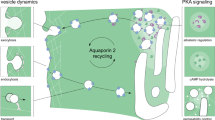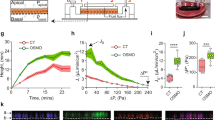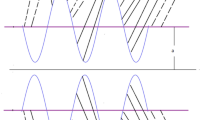Abstract
THE purpose of this communication is to derive the partial differential equations and to clarify the mathematical details described in connexion with a model used to obtain the sodium concentration profile in the renal medulla1. An elementary operating unit of the model is shown in Fig. 1. A generalized segment of a vascular or tubular channel is shown in the top half of Fig. 2. Consider the case where fluid moves in a direction from left to right, corresponding to motion in the descending limbs of the vas rectum or the Henle loop. The net change of sodium concentration ΔC(g/cm3) in the differential volume element of length ΔX shown is given by equation (1). 
This is a preview of subscription content, access via your institution
Access options
Subscribe to this journal
Receive 51 print issues and online access
$199.00 per year
only $3.90 per issue
Buy this article
- Purchase on Springer Link
- Instant access to full article PDF
Prices may be subject to local taxes which are calculated during checkout
Similar content being viewed by others
References
Pinter, G. G., and Shohet, J. L., Nature, 200, 955 (1963).
Author information
Authors and Affiliations
Rights and permissions
About this article
Cite this article
SHOHET, J., PINTER, G. Derivation of the Partial Differential Equations utilized in a Model describing the Na Concentration Profile in the Renal Medulla. Nature 204, 689–690 (1964). https://doi.org/10.1038/204689a0
Published:
Issue Date:
DOI: https://doi.org/10.1038/204689a0
This article is cited by
-
Models of the urinary concentrating mechanism
Kidney International (1987)
-
A computer model of the renal countercurrent system
Kidney International (1972)
-
Concentration of urine in a central core model of the renal counterflow system
Kidney International (1972)
-
The theory of urine formation in water diuresis with implications for antidiuresis
The Bulletin of Mathematical Biophysics (1967)
-
Ability of Counterflow Systems to Concentrate
Nature (1965)
Comments
By submitting a comment you agree to abide by our Terms and Community Guidelines. If you find something abusive or that does not comply with our terms or guidelines please flag it as inappropriate.



